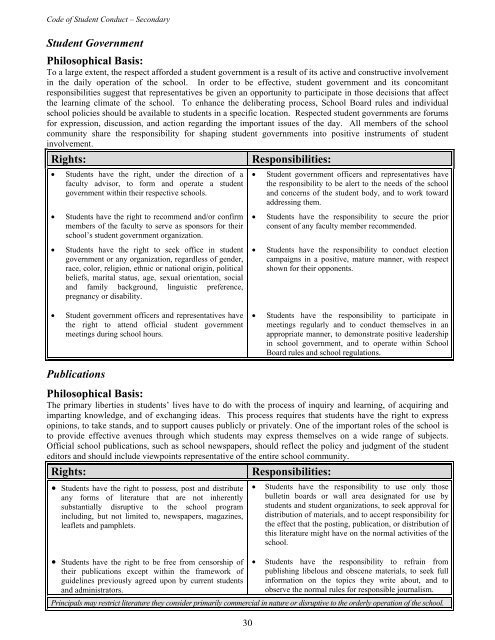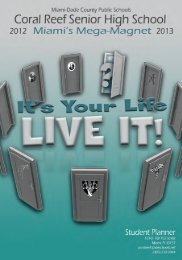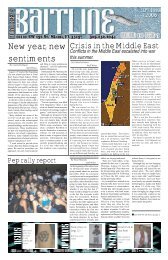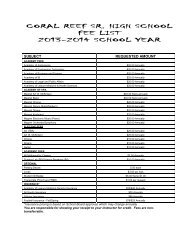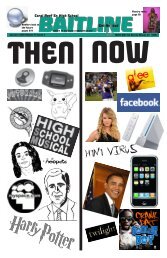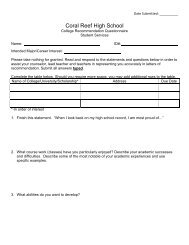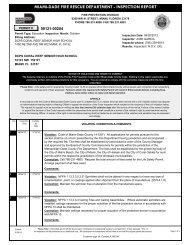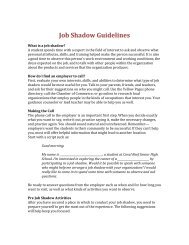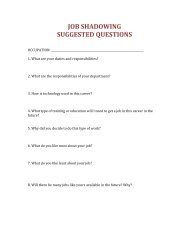Code of Student Conduct - Coral Reef Senior High School - Miami ...
Code of Student Conduct - Coral Reef Senior High School - Miami ...
Code of Student Conduct - Coral Reef Senior High School - Miami ...
Create successful ePaper yourself
Turn your PDF publications into a flip-book with our unique Google optimized e-Paper software.
<strong>Code</strong> <strong>of</strong> <strong>Student</strong> <strong>Conduct</strong> – Secondary<br />
<strong>Student</strong> Government<br />
Philosophical Basis:<br />
To a large extent, the respect afforded a student government is a result <strong>of</strong> its active and constructive involvement<br />
in the daily operation <strong>of</strong> the school. In order to be effective, student government and its concomitant<br />
responsibilities suggest that representatives be given an opportunity to participate in those decisions that affect<br />
the learning climate <strong>of</strong> the school. To enhance the deliberating process, <strong>School</strong> Board rules and individual<br />
school policies should be available to students in a specific location. Respected student governments are forums<br />
for expression, discussion, and action regarding the important issues <strong>of</strong> the day. All members <strong>of</strong> the school<br />
community share the responsibility for shaping student governments into positive instruments <strong>of</strong> student<br />
involvement.<br />
Rights:<br />
Responsibilities:<br />
• <strong>Student</strong>s have the right, under the direction <strong>of</strong> a<br />
faculty advisor, to form and operate a student<br />
government within their respective schools.<br />
• <strong>Student</strong>s have the right to recommend and/or confirm<br />
members <strong>of</strong> the faculty to serve as sponsors for their<br />
school’s student government organization.<br />
• <strong>Student</strong>s have the right to seek <strong>of</strong>fice in student<br />
government or any organization, regardless <strong>of</strong> gender,<br />
race, color, religion, ethnic or national origin, political<br />
beliefs, marital status, age, sexual orientation, social<br />
and family background, linguistic preference,<br />
pregnancy or disability.<br />
• <strong>Student</strong> government <strong>of</strong>ficers and representatives have<br />
the responsibility to be alert to the needs <strong>of</strong> the school<br />
and concerns <strong>of</strong> the student body, and to work toward<br />
addressing them.<br />
• <strong>Student</strong>s have the responsibility to secure the prior<br />
consent <strong>of</strong> any faculty member recommended.<br />
• <strong>Student</strong>s have the responsibility to conduct election<br />
campaigns in a positive, mature manner, with respect<br />
shown for their opponents.<br />
• <strong>Student</strong> government <strong>of</strong>ficers and representatives have<br />
the right to attend <strong>of</strong>ficial student government<br />
meetings during school hours.<br />
• <strong>Student</strong>s have the responsibility to participate in<br />
meetings regularly and to conduct themselves in an<br />
appropriate manner, to demonstrate positive leadership<br />
in school government, and to operate within <strong>School</strong><br />
Board rules and school regulations.<br />
Publications<br />
Philosophical Basis:<br />
The primary liberties in students’ lives have to do with the process <strong>of</strong> inquiry and learning, <strong>of</strong> acquiring and<br />
imparting knowledge, and <strong>of</strong> exchanging ideas. This process requires that students have the right to express<br />
opinions, to take stands, and to support causes publicly or privately. One <strong>of</strong> the important roles <strong>of</strong> the school is<br />
to provide effective avenues through which students may express themselves on a wide range <strong>of</strong> subjects.<br />
Official school publications, such as school newspapers, should reflect the policy and judgment <strong>of</strong> the student<br />
editors and should include viewpoints representative <strong>of</strong> the entire school community.<br />
Rights:<br />
• <strong>Student</strong>s have the right to possess, post and distribute<br />
any forms <strong>of</strong> literature that are not inherently<br />
substantially disruptive to the school program<br />
including, but not limited to, newspapers, magazines,<br />
leaflets and pamphlets.<br />
• <strong>Student</strong>s have the right to be free from censorship <strong>of</strong><br />
their publications except within the framework <strong>of</strong><br />
guidelines previously agreed upon by current students<br />
and administrators.<br />
Responsibilities:<br />
• <strong>Student</strong>s have the responsibility to use only those<br />
bulletin boards or wall area designated for use by<br />
students and student organizations, to seek approval for<br />
distribution <strong>of</strong> materials, and to accept responsibility for<br />
the effect that the posting, publication, or distribution <strong>of</strong><br />
this literature might have on the normal activities <strong>of</strong> the<br />
school.<br />
• <strong>Student</strong>s have the responsibility to refrain from<br />
publishing libelous and obscene materials, to seek full<br />
information on the topics they write about, and to<br />
observe the normal rules for responsible journalism.<br />
Principals may restrict literature they consider primarily commercial in nature or disruptive to the orderly operation <strong>of</strong> the school.<br />
30


